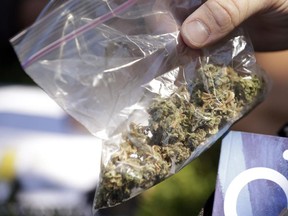Legalized marijuana: Will there be a Société du cannabis du Québec?
The Quebec government is reportedly considering tapping the SAQ to set up a smaller, parallel network of stores

Article content
Will you be able to pick up a bag of pot at a Société du cannabis du Québec, run by the same people who sell you wine and scotch?
Employees of the province’s liquor stores — the Société des alcools du Québec (SAQ) — hope so.
But Montreal’s public-health system is dead set against that idea, suggesting the SAQ should not be a model because it promotes the use of alcohol to fill government coffers.
On Thursday, Ottawa announced its long-awaited legalization plan, saying it wants to provide regulated access to recreational cannabis no later than July 2018.
But, like many aspects of the plan, distribution details haven’t been worked out.
The Quebec government is reportedly considering tapping the SAQ to set up a smaller, parallel network of stores to sell marijuana. But it has not ruled out distribution via pharmacies or other private companies.
With just over a year to go before the planned legalization, Alexandre Joly, head of the union representing 5,500 SAQ employees, said Premier Philippe Couillard must quickly answer the fundamental question of how distribution will work.
Otherwise, “other players will fill the void and the government risks losing control.”
Only a state operation “whose social and financial objectives are defined by the government” is in a position to “ensure the strictest respect for government standards and the framework,” said Joly, president of the Syndicat des employés de magasins et de bureaux de la SAQ.
In December, the union released a study that suggested the economic spinoffs would be higher if the SAQ controlled pot distribution.
The SAQ could add $457 million to the provincial treasury in the first year of legalization, according to the study, by the Institut de recherche et d’informations socio-économiques.
Within 10 years, the study said, the value of Quebec’s pot market could climb to $3.2 billion per year.
“The SAQ is better equipped to withstand the pressures from players in the black market and (provide) a more secure framework for the sale of a product that poses risks to public health,” Philippe Hurteau, co-author of the study, said in December.
The study, which the union helped finance, recommended giving the SAQ distribution rights for the first 10 years, after which the government could reassess the situation and possibly open the market to the private sector.
However, Montreal’s public health department says if the government is involved in selling pot, a new provincial agency should be in charge — one that would not be under government pressure to increase profits.
“Such a monopoly should not be regarded as a major source of revenue” for the province, the department said in a recent report. “The SAQ, from which the government demands profits, is not a model.”
Quebec “must take all necessary measures to prevent legalization from leading to an increase in (marijuana) consumption,” it said.
Quebec Finance Minister Carlos Leitão, who oversees the SAQ, seemed to rule out a government role in distribution last year. “I have no plan, no idea, no intention to market cannabis,” he said in February 2016. “It will be up to (Ottawa) to determine how to commercialize it. I’m not interested in that.”
But that was before Ottawa announced a plan that leaves the decision on how pot will be distributed in the hands of the provinces.
Quebec has complained that Ottawa’s project is vague, off-loads new responsibilities onto provinces, and fails to explain who will cover the cost of legalization.
In December, a federal task force recommended against distributing pot in stores that also sell alcohol, echoing the public health department.
“Given the wide use and availability of liquor stores, concerns were raised about product promotion and exposing a larger population to cannabis products should sales be co-located, as well as the impact on cannabis consumers who are trying to avoid alcohol,” the task force said in its report.
Selling the two products together could encourage people to use them jointly.
“Research shows that the simultaneous use of alcohol and cannabis significantly increases levels of THC in the blood,” the task force said. “This has implications for behaviour while intoxicated, and particularly for impaired driving.
All U.S. states that have legalized cannabis have banned “the co-location of sales of cannabis and alcohol,” the report noted.
Last year, the Jean Coutu pharmacy chain said it was open to the idea of selling medical marijuana, but chief executive François Coutu said he was opposed to the sale of recreational marijuana in pharmacies.






Postmedia is committed to maintaining a lively but civil forum for discussion. Please keep comments relevant and respectful. Comments may take up to an hour to appear on the site. You will receive an email if there is a reply to your comment, an update to a thread you follow or if a user you follow comments. Visit our Community Guidelines for more information.